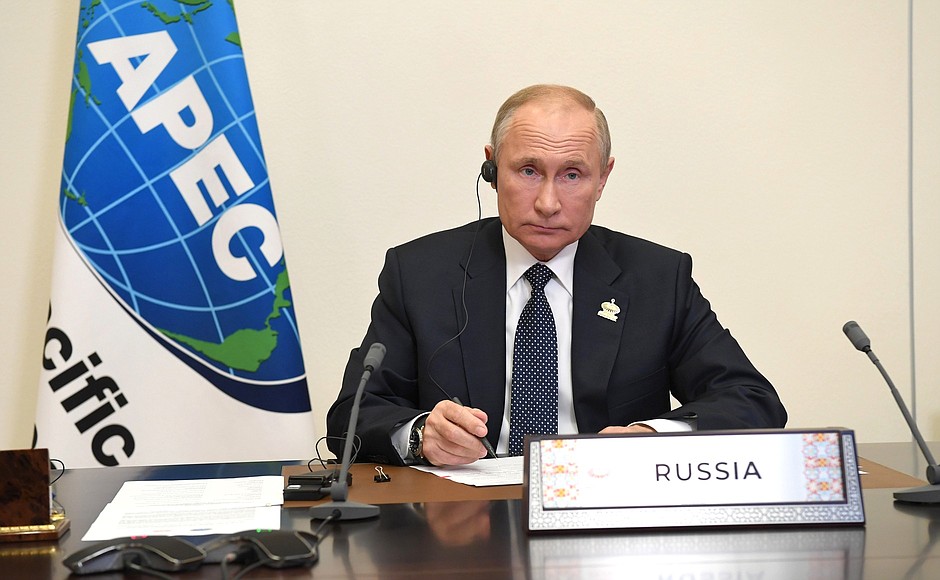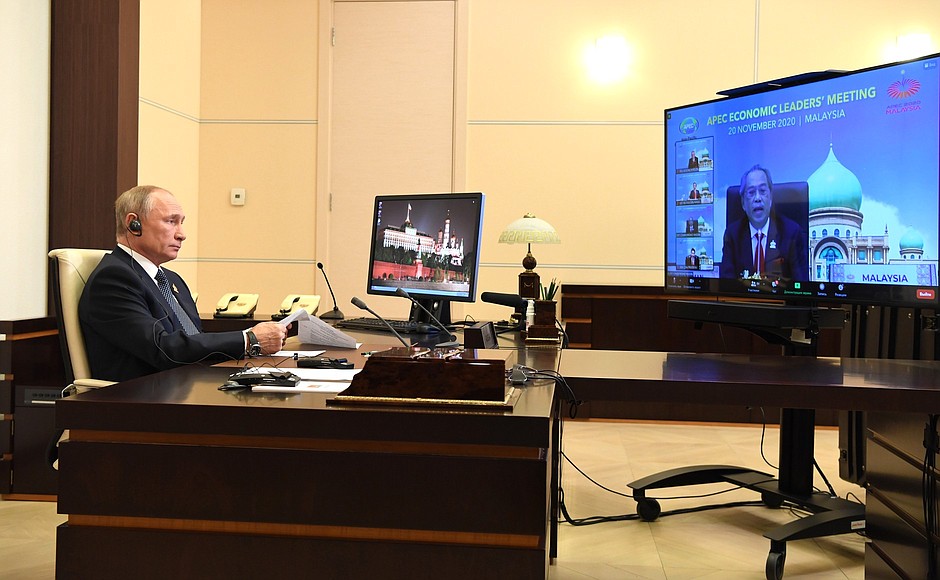The meeting, held via videoconference under the chairmanship of Prime Minister of Malaysia Muhyiddin Yassin, focused on ways of overcoming the social and economic aftermath of the novel coronavirus pandemic. The leaders also discussed prospects for cooperation within APEC, including free trade and greater investment.
Following the meeting, 2020 Kuala Lumpur Declaration and APEC Putrajaya Vision 2040 were adopted.
* * *
President of Russia Vladimir Putin: Mr Chairman, colleagues,
First of all, I would like to join the positive assessments of the work done by Malaysia this year as the APEC chairman. Thank you, Mr Chairman.
See also
Importantly, despite the obvious difficulties caused by the spread of the coronavirus, APEC cooperation has been making steady headway. The intensive and substantive agenda that we are discussing at today’s summit attests to that.
It goes without saying that our priority is to pool efforts in countering the coronavirus, as the Chairman has just said. Russia has much to offer our partners and friends. We have amassed solid scientific and, already, clinical experience in this area. I would like to recall that Russia has developed and registered two vaccines: Sputnik V andEpiVacCorona. One more vaccine, a third one, is undergoing final tests now. Together with our foreign partners, we are actively studying opportunities for their supply and production localisation.
I would like to emphasise that both vaccines meet the two most important criteria: they are absolutely safe and effective. All that is left is to develop their full-scale production. We are launching it in Russia.
We can see that the pandemic has resulted in serious problems in most Asian-Pacific countries. The number of those infected in the region exceeds 26 million, while according to the WHO, the total worldwide is 56 million. The coronavirus and its complications have been taking even more lives.
Alarming trends can be seen in the economy and the social sphere. As the IMF head has already said, due to the industrial production decline and financial difficulties, tens of millions are at risk of falling below the poverty line.
According to forecasts, the global GDP will drop by 4.4 percent in 2020, and the total APEC GDP will decrease by about 2.5 percent. Russia will also see a downturn of 3.9 percent according to our estimations. During the last six months, the international trade figures fell by over 15 percent. Economic disputes between leading players in the market are escalating.
The abovementioned negative trends make it possible to objectively assess the real situation and, of course, compel the international community join ranks and take steps together in order to set the situation right.
Russia is ready to cooperate with all the interested countries, including, of course, its APEC partners, as closely as possible. In particular, back in spring we suggested creating “green corridors” free from sanctions and restrictions, above all concerning foodstuffs and medicines. And, of course, first of all with the countries that need them most. We believe the implementation of this initiative would help to ease the humanitarian tensions in the world and develop global trade, which almost all the speakers here addressed.
We think cooperation between Asian-Pacific countries in the digital sphere is becoming more important, as has already been mentioned today. I mean broad ICT introduction for the continuous operation of state governance and city economic systems, for providing remote medical educational and social services and for ensuring small and medium-sized businesses have access to these services, markets and capital.
We believe it is worth thinking about coordinating APEC efforts on protecting personal information and preventing IT offences. This is extremely important because of the growth of the digital economy. In expert estimates, by 2021 the world may lose about six trillion dollars due to cybercrime.
I agree with what many leaders said in their speeches, notably, that one of the main tasks of APEC activities is to create in the Asia-Pacific Region an open and sustainable community for ensuring the welfare of people in all of our countries. Therefore, we certainly support the coordinated draft declaration of our summit on long-term APEC development goals until 2040.
That said, we believe that to reach the ambitious future goals it is important to continue cooperating on the basis of the fundamental principles of the UN Charter, which are sovereign equality of states, non-interference in internal affairs, and respect for the right of nations to their own development model.
It is necessary to involve in cooperation not only the economies of the region but also its integration associations. Today life itself is prompting the need to unite their potentials for overcoming a broad range of challenges and implementing large-scale cross-border projects. This is exactly the goal of the Russian initiative on creating a Greater Eurasian Partnership in security and economic and humanitarian cooperation.
Let me emphasise that Russia is willing to work jointly with all APEC countries. We will actively assist New Zealand, which assumes the APEC chairmanship next year. We wish success to our partners in New Zealand.
Thank you for your attention.

